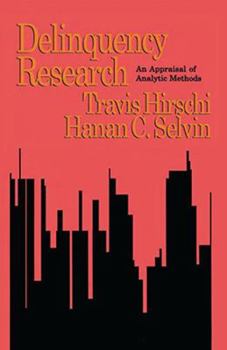Delinquency Research: An Appraisal of Analytic Methods
Select Format
Select Condition 
Book Overview
This remarkable guide to delinquency studies was co-winner of the 1968 C. Wright Mills Award for the best book in the field of social problems. The work is in effect three books in one: a forthright account of how to analyze survey data, a penetrating critique of delinquency research, and a set of original essays on methodology. It is a landmark work that continues to serve as an essential tool for those who both study and want to learn about deviance. In the new introduction, Travis Hirschi describes the setting in which 'Delinquency Research' was written, noting that it exudes a confident optimism that well-conducted research and analysis will quickly lead to important advances in the field. Hirschi maintains that twenty-eight years after 'Delinquency Research' was first published the validity of its optimistic view has been confirmed by the fact that the field of criminology is among the leading producers of high quality research. As a result, we know more about crime and delinquency than ever before. 'Delinquency Research' forms the basis for present and future studies of criminology and is a necessary addition to the libraries of sociologists, criminologists, scholars in the area of delinquency, and students interested in research methods.
Format:Hardcover
Language:English
ISBN:1138522090
ISBN13:9781138522091
Release Date:October 2017
Publisher:Routledge
Length:312 Pages
Weight:1.30 lbs.
Dimensions:0.8" x 6.0" x 9.0"
Customer Reviews
1 rating
Informal treatment of causal analysis
Published by Thriftbooks.com User , 16 years ago
I used the first (1967) printing of Delinquency Research: An Appraisal of Analytical Methods in an undergraduate sociology research methods course. The book was and remains interesting, accessible, and timely. The procedures presented by Hirschi and Selvin for making causal inferences with non-experimental quantitative data are as useful today as when the book first appeared. The fact that the authors were able to present this information without overwhelming the reader with sophisticated and difficult-to-understand statistical methods is a tribute to the thoughtful organization of the volume, as well as to the readable prose produced by the authors. A good part of the book's interest inheres in the author's decision to write much of it in response to flawed research done on delinquency by others, especially the once-famous and influential Gluecks. As the authors' presentation develops, it becomes abundantly clear that the Gluecks' book Unraveling Juvenile Delinquency is sadly mis-titled. The primary reason for this is undue emphasis on bivariate relationships presented in tabular form. Hirschi and Selvin make clear that failure to introduce controls renders the Gluecks' interpretation of their data dubious, at best, and often simply wrong. The Gluecks' approach fails to address the ubiquitous issue of confounding. I know of no recently published text that is as instructive and accessible for the beginning causal analyst as Delinquency Research. The first one hundred forty-one pages are especially good, a book in themselves. The material in subsequent chapters is also accessible, useful, and interesting, but not essential to understanding Hirschi and Selvin's causal framework. If a recent text of comparable quality were published, I'd definitely use it in my introductory course in quantitative research methods for non-experimental data. As it is, I still use the 1967 printing as a means of prompting myself to come up with useful examples of the consequences of failing to address the issue of confounding and the payoffs which come with taking confounding seriously in causal analyses. After working through Delinquency Research, the reader will never again look at two-variable relationships with an uncritical eye.





